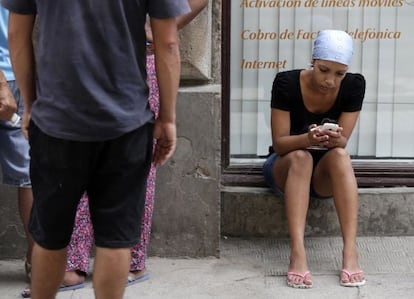Cuba promises to offer internet to all citizens — with restrictions
More and more Cubans have access to cellphones and email accounts


The Cuban government has promised that it will allow its citizens to access the internet from their homes – something that can currently only be done at state-run internet cafés – but it said it would not permit them to access “counter-revolutionary” sites financed by Washington.
Cuba has recently made inroads into opening up its society and allowing people to connect with the outside world. But according to dissidents, new technologies are still restricted in many ways because Cuban Communist Party (PCC) leaders fear that more openness will lead to them losing their hold on absolute power.
At the same time, Havana angrily lodged a protest with Washington last week over its promotion of an ambitious cellphone texting service designed to bombard users with anti-Castro messages.
On a recent day when Cuban authorities denied to EL PAÍS that they were restricting access to global networks, dozens of young people interested in purchasing a cellphone, opening an email account and surfing the internet could be seen crowding in front of the state-run ETECSA communications office in Havana’s El Vedado district.
An estimated two million Cubans, out of a total population of 11 million, own a cellphone – a growing number, but still miniscule compared with other Latin American nations. Around 330,000 islanders are also permitted to surf the internet through government-approved accounts. Cubans can check their emails at cybercafés and by cellphone through a new state domain: name@nauta.cu.
They don’t want everyone using Facebook or Twitter”
Another undetermined number use pirated internet signals or email accounts opened by friends abroad.
“There is no censorship but we lack the technical capability to offer more than what we can offer with the budget we have,” explains Tania Velázquez, an ETECSA official. The state communications agency runs 118 internet centers for the public across the island, containing a total of 520 computers running on slow 2G networks. Government officials have their own internet service.
“We need to invest more, in the manner in which we can, to obtain more technical capacity but there are no regulatory or commercial barriers. Our objective is to reach all households,” says Luis Manuel Díaz, another ETECSA official.
But sources say the government has no intention of allowing this to happen. The connectivity is there: an underwater fiber optic cable linking Cuba with Venezuela has been in operation for about a year now.
“They don’t want everyone using Facebook or Twitter, and allowing people to always be connected, which could lead to an eventual mobilization,” says one businessman, who describes himself as “interested” in President Raúl Castro’s economic reforms.
An estimated two million Cubans, out of a total population of 11 million, own a cellphone
But the Cuban government also has other reasons. On Thursday, the Cuban Foreign Ministry lodged an official complaint over a plan by agencies and private companies with links to the Obama administration “to promote subversion” on the island.
The complaint came after the Associated Press reported earlier this month that the United States tried to initiate a “Twitter-like” Cuban messaging service called Zunzuneo to offer news, sports and entertainment to thousands of subscribers on the island. According to the plan – supported by documents and interviews obtained by AP – once the service reached a certain number of subscribers, political messages would be transmitted in the hope of mobilizing the people to push for change.
According to AP, the system was developed in Barcelona. The Obama administration defended the program and said it complied with US anti-espionage and trade laws but there are critics who believe otherwise.
Two years ago, the US Treasury Department imposed a $1.75 billion fine on Ericsson, the world's biggest cellphone company, for doing business with Cuba and violating the 1962 US embargo with the island.
And there have been ways to circumvent US laws. In 2007, Cuba and Venezuela signed an agreement for a fiber optic cable that connected the island with the South American nation, which went into operation last year and has given the island better connectivity.
Tu suscripción se está usando en otro dispositivo
¿Quieres añadir otro usuario a tu suscripción?
Si continúas leyendo en este dispositivo, no se podrá leer en el otro.
FlechaTu suscripción se está usando en otro dispositivo y solo puedes acceder a EL PAÍS desde un dispositivo a la vez.
Si quieres compartir tu cuenta, cambia tu suscripción a la modalidad Premium, así podrás añadir otro usuario. Cada uno accederá con su propia cuenta de email, lo que os permitirá personalizar vuestra experiencia en EL PAÍS.
¿Tienes una suscripción de empresa? Accede aquí para contratar más cuentas.
En el caso de no saber quién está usando tu cuenta, te recomendamos cambiar tu contraseña aquí.
Si decides continuar compartiendo tu cuenta, este mensaje se mostrará en tu dispositivo y en el de la otra persona que está usando tu cuenta de forma indefinida, afectando a tu experiencia de lectura. Puedes consultar aquí los términos y condiciones de la suscripción digital.








































